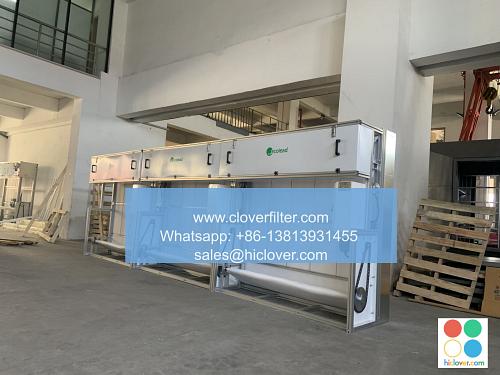Automatic Roll Air Filters: A Comprehensive Guide for Newfoundland’s Offshore Oil Industry

Introduction to Automatic Roll Air Filters
In Newfoundland’s offshore oil industry, maintaining a clean and efficient air filtration system is crucial for optimal equipment performance, reduced downtime, and a safe working environment. One innovative solution gaining popularity in this sector is the automatic roll air filter (ARAF). This comprehensive guide aims to delve into the world of ARAFs, exploring their benefits, functionality, and application within the offshore oil industry of Newfoundland.
What are Automatic Roll Air Filters?
An automatic roll air filter is a type of air filtration system designed to automatically renew its filter media as it becomes clogged with particulates, thereby ensuring a consistent airflow and filtration efficiency. Unlike traditional air filters that need to be manually replaced or cleaned, ARAFs operate with minimal human intervention, making them particularly suitable for remote or hard-to-reach locations such as those found in offshore oil platforms.
How Do Automatic Roll Air Filters Work?
The operation of an ARAF revolves around a continuous roll of filter media that unwinds as the filter becomes saturated with dust and other airborne contaminants. The process begins with clean filter media unwinding from a supply roll and passing through the airflow path, where it captures particulates. As the layer of filter media becomes dirty, it is automatically cut and wound onto a disposal roll, simultaneously being replaced by a fresh, clean layer from the supply roll. This continuous replacement ensures that the airflow remains constant, and the filtration efficiency is maintained at optimal levels.
Benefits of Automatic Roll Air Filters in the Offshore Oil Industry
The integration of ARAFs into Newfoundland’s offshore oil platforms can yield several benefits, including enhanced air quality, reduced maintenance costs, and increased operational efficiency. Traditional air filters may become clogged quickly in the harsh marine environment surrounding offshore platforms, leading to increased energy consumption and frequent maintenance. In contrast, ARAFs minimize downtime and reduce the manpower required for filter replacements, contributing to overall cost savings and improved safety for workers.
Application and Installation Considerations
The successful deployment of ARAFs in the offshore oil industry requires careful consideration of the operating environment, including temperature, humidity, and the presence of corrosive substances. The filters must be designed and constructed to withstand these conditions, possibly including features such as corrosion-resistant materials and protective enclosures. Moreover, the installation process should ensure that the ARAF system is properly integrated with existing air handling systems, necessitating a thorough assessment of the platform’s ventilation requirements and filter compatibility.
Maintenance and Operational Best Practices
While ARAFs are designed to operate with minimal maintenance, regular inspections and replacements of the filter media rolls are essential to ensure continuous performance. Training personnel on the correct operation, maintenance, and troubleshooting of ARAF systems can significantly extend their lifespan and optimize their efficiency. Additionally, implementing a preventive maintenance schedule can help identify and address potential issues before they lead to system downtime or failure.
Conclusion
Automatic roll air filters present a viable and efficient solution for improving air quality and reducing maintenance burdens in Newfoundland’s offshore oil industry. By understanding the operational principles, benefits, and application considerations of ARAFs, operators can make informed decisions about integrating these systems into their facilities. As the industry continues to evolve, embracing innovative technologies like ARAFs can play a crucial role in enhancing operational efficiency, safety, and environmental stewardship.
Frequently Asked Questions (FAQs)
- Q: What are the primary advantages of using automatic roll air filters in offshore oil platforms?
A: The primary advantages include reduced maintenance costs, enhanced air quality, and increased operational efficiency due to minimal downtime for filter replacements.
- Q: How often does the filter media need to be replaced in an ARAF system?
A: The replacement frequency of the filter media roll depends on the operating conditions, including airflow rate, particulate concentration, and filter type. Regular inspections can help determine the optimal replacement schedule.
- Q: Are ARAFs suitable for use in harsh or corrosive environments?
A: Yes, ARAFs can be designed with materials and features that make them suitable for harsh environments, including corrosion-resistant coatings and protective housings.
- Q: Can ARAFs be integrated with existing air handling systems in offshore oil platforms?
A: Yes, ARAFs can be designed to be compatible with a variety of air handling systems. Proper assessment and planning are necessary to ensure seamless integration and optimal performance.

